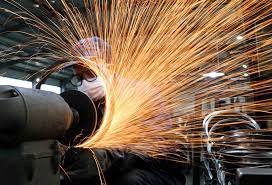
Factory gate prices in China for January dropped more than economists anticipated, indicating that upstream industries are not yet strong enough to rekindle the domestic demand that briefly stoked consumer prices after the zero-COVID policy ended.
Even though manufacturing activity increased in January, the producer price index (PPI) was down 0.8% from a year earlier, expanding the 0.7% decline from the previous month and faster than the 0.5% fall predicted in a Reuters poll.
Data from the National Bureau of Statistics (NBS) on Friday showed that the consumer price index (CPI) was 2.1% higher than a year earlier in January, up from the 1.8% annual gain seen in December, but just short of the 2.2% increase economists had predicted in a Reuters poll.
Due to a seasonal uptick in spending during the Lunar New Year festival, the CPI increased. According to NBS data, airfares, movie tickets, and travel prices increased by respectively 20.3%, 10.7%, and 9.3%.
Since China's zero-COVID policy has been abandoned, economists anticipate a rise in living expenses over the upcoming months. Analysts of Chinese policy anticipate the country to maintain its 3% inflation target for this year.
Analysts predict that inflation will remain significantly lower than the high rates experienced in Western nations and that monetary easing will likely occur more frequently than tightening.
"We anticipate further cuts to policy rates before long, the first of which might come as soon as next Wednesday," Julian Evans-Pritchard, senior China economist at Capital Economics said in a note.
The second-largest economy in the world is still dealing with serious challenges, such as a failing real estate market, declining foreign demand for Chinese exports, and youth unemployment rates that are approaching record highs.
The unexpected monthly PPI decline of 0.4% seemed to indicate that the manufacturing sector was not yet operating at full capacity, according to Zhou Hao, chief economist at Guotai Junan International, in a note.
Given that China's economic activity resumed growth in January, the decline in factory gate prices was unexpected. For the first time since September, the official purchasing managers' index (PMI), which gauges manufacturing activity, has surpassed the 50-point mark.
The steeper decline than anticipated was caused by falling input costs, including chemical costs as well as lower crude oil and domestic coal prices.
Consumer food prices increased by 6.2% in January compared to the same month last year, following a 4.8% increase in December.
As the supply of live pigs continued to grow, but was up 11.8% on the year, pork prices dropped by 10.8% in January, a decrease of 2.1 percentage points from the previous month.
Core inflation, which excludes prices for food and energy, increased by 0.2 percentage points last month to 1.2% from 0.7% in December.
After the economy shrank to one of its weakest levels in nearly 50 years in 2022, senior government officials repeatedly signaled their intention to tap into the 1.4 billion people who make up the nation.
(Source:www.latestly.com)
Even though manufacturing activity increased in January, the producer price index (PPI) was down 0.8% from a year earlier, expanding the 0.7% decline from the previous month and faster than the 0.5% fall predicted in a Reuters poll.
Data from the National Bureau of Statistics (NBS) on Friday showed that the consumer price index (CPI) was 2.1% higher than a year earlier in January, up from the 1.8% annual gain seen in December, but just short of the 2.2% increase economists had predicted in a Reuters poll.
Due to a seasonal uptick in spending during the Lunar New Year festival, the CPI increased. According to NBS data, airfares, movie tickets, and travel prices increased by respectively 20.3%, 10.7%, and 9.3%.
Since China's zero-COVID policy has been abandoned, economists anticipate a rise in living expenses over the upcoming months. Analysts of Chinese policy anticipate the country to maintain its 3% inflation target for this year.
Analysts predict that inflation will remain significantly lower than the high rates experienced in Western nations and that monetary easing will likely occur more frequently than tightening.
"We anticipate further cuts to policy rates before long, the first of which might come as soon as next Wednesday," Julian Evans-Pritchard, senior China economist at Capital Economics said in a note.
The second-largest economy in the world is still dealing with serious challenges, such as a failing real estate market, declining foreign demand for Chinese exports, and youth unemployment rates that are approaching record highs.
The unexpected monthly PPI decline of 0.4% seemed to indicate that the manufacturing sector was not yet operating at full capacity, according to Zhou Hao, chief economist at Guotai Junan International, in a note.
Given that China's economic activity resumed growth in January, the decline in factory gate prices was unexpected. For the first time since September, the official purchasing managers' index (PMI), which gauges manufacturing activity, has surpassed the 50-point mark.
The steeper decline than anticipated was caused by falling input costs, including chemical costs as well as lower crude oil and domestic coal prices.
Consumer food prices increased by 6.2% in January compared to the same month last year, following a 4.8% increase in December.
As the supply of live pigs continued to grow, but was up 11.8% on the year, pork prices dropped by 10.8% in January, a decrease of 2.1 percentage points from the previous month.
Core inflation, which excludes prices for food and energy, increased by 0.2 percentage points last month to 1.2% from 0.7% in December.
After the economy shrank to one of its weakest levels in nearly 50 years in 2022, senior government officials repeatedly signaled their intention to tap into the 1.4 billion people who make up the nation.
(Source:www.latestly.com)





